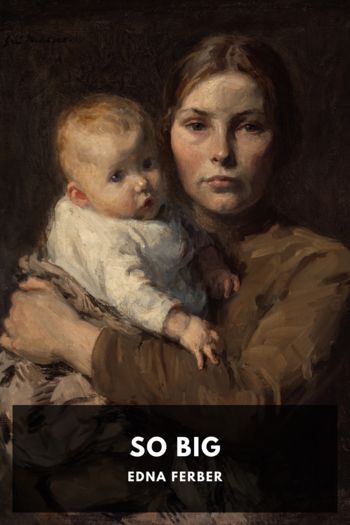So Big, Edna Ferber [best classic novels .txt] 📗

- Author: Edna Ferber
Book online «So Big, Edna Ferber [best classic novels .txt] 📗». Author Edna Ferber
“Well,” thought Dirk, “she looks a sight.”
Dallas O’Mara waved a friendly hand toward some chairs on which were piled hats, odd garments, bristol board and (on the broad arm of one) a piece of yellow cake. “Sit down.” She called to the girl who had opened the door to them: “Gilda, will you dump some of those things. This is Mrs. Storm, Mr. DeJong—Gilda Hanan.” Her secretary, Dirk later learned.
The place was disorderly, comfortable, shabby. A battered grand piano stood in one corner. A great skylight formed half the ceiling and sloped down at the north end of the room. A man and a girl sat talking earnestly on the couch in another corner. A swarthy foreign-looking chap, vaguely familiar to Dirk, was playing softly at the piano. The telephone rang. Miss Hanan took the message, transmitted it to Dallas O’Mara, received the answer, repeated it. Perched atop the stool, one slippered foot screwed in a rung, Dallas worked on concentratedly, calmly, earnestly. A lock of hair straggled over her eyes. She pushed it back with her wrist and left another dark splotch on her forehead. There was something splendid, something impressive, something magnificent about her absorption, her indifference to appearance, her unawareness of outsiders, her concentration on the work before her. Her nose was shiny. Dirk hadn’t seen a girl with a shiny nose in years. They were always taking out those little boxes and things and plastering themselves with the stuff in ’em.
“How can you work with all this crowd around?”
“Oh,” said Dallas in that deep restful leisurely voice of hers, “there are always between twenty and thirty”—she slapped a quick scarlet line on the board, rubbed it out at once—“thousand people in and out of here every hour, just about. I like it. Friends around me while I’m slaving.”
“Gosh!” he thought, “she’s—I don’t know—she’s—”
“Shall we go?” said Paula.
He had forgotten all about her. “Yes. Yes, I’m ready if you are.”
Outside, “Do you think you’re going to like the picture?” Paula asked. They stepped into her car.
“Oh, I don’t know. Can’t tell much about it at this stage, I suppose.”
“Back to your office?”
“Sure.”
“Attractive, isn’t she?”
“Think so?”
So he was going to be on his guard, was he! Paula threw in the clutch viciously, jerked the lever into second speed. “Her neck was dirty.”
“Crayon dust,” said Dirk.
“Not necessarily,” replied Paula.
Dirk turned sideways to look at her. It was as though he saw her for the first time. She looked brittle, hard, artificial—small, somehow. Not in physique but in personality.
The picture was finished and delivered within ten days. In that time Dirk went twice to the studio in Ontario Street. Dallas did not seem to mind. Neither did she appear particularly interested. She was working hard both times. Once she looked as he had seen her on her first visit. The second time she had on a fresh crisp smock of faded yellow that was glorious with her hair; and high-heeled beige kid slippers, very smart. She was like a little girl who has just been freshly scrubbed and dressed in a clean pinafore, Dirk thought.
He thought a good deal about Dallas O’Mara. He found himself talking about her in what he assumed to be a careless offhand manner. He liked to talk about her. He told his mother of her. He could let himself go with Selina and he must have taken advantage of this for she looked at him intently and said: “I’d like to meet her. I’ve never met a girl like that.”
“I’ll ask her if she’ll let me bring you up to the studio some time when you’re in town.”
It was practically impossible to get a minute with her alone. That irritated him. People were always drifting in and out of the studio—queer, important, startling people; little, dejected, shabby people. An impecunious girl art student, red-haired and wistful, that Dallas was taking in until the girl got some money from home; a pearl-hung grand-opera singer who was condescending to the Chicago Opera for a fortnight. He did not know that Dallas played until he came upon her late one afternoon sitting at the piano in the twilight with Bert Colson, the blackface comedian. Colson sang those terrible songs about April showers bringing violets, and about mah Ma-ha-ha-ha-ha-ha-ha-my but they didn’t seem terrible when he sang them. There was about this lean, hollow-chested, sombre-eyed comedian a poignant pathos, a gorgeous sense of rhythm—a something unnameable that bound you to him, made you love him. In the theatre he came out to the edge of the runway and took the audience in his arms. He talked like a bootblack and sang like an angel. Dallas at the piano, he leaning over it, were doing “blues.” The two were rapt, ecstatic. I got the blues—I said the blues—I got the this or that—the somethingorother—blue—hoo-hoos. They scarcely noticed Dirk. Dallas had nodded when he came in, and had gone on playing. Colson sang the cheaply sentimental ballad as though it were the folksong of a tragic race. His arms were extended, his face rapt. As Dallas played the tears stood in her eyes. When they had finished, “Isn’t it a terrible song?” she said. “I’m crazy about it. Bert’s going to try it out tonight.”
“Who—uh—wrote it?” asked Dirk politely.
Dallas began to play again. “H’m? Oh, I did.” They were off once more. They paid no more attention to Dirk. Yet there was nothing rude about their





Comments (0)